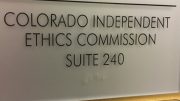By Jeffrey A. Roberts
CFOIC Executive Director
A judge’s decision to restrict access to records in the case of a cardiologist accused of sexually assaulting and drugging victims does not comply with a 2021 Colorado rule meant to shine a light on why courts sometimes keep documents from the public in criminal proceedings, news organizations argue in new filings.
The Colorado News Collaborative (COLab) and the Washington, D.C.-based Fuller Project are objecting to a Oct. 27 suppression order from Denver District Court Judge Eric Johnson, which includes exhibits admitted into evidence in open court during August and September preliminary hearings against Stephen Matthews, who faces dozens of felony counts.

“The Exhibits appear to have been admitted in open court and readily observed by anyone in the courtroom, including the public and the press,” says COLab’s objection, submitted Friday by attorney Rachael Johnson of the Reporters Committee for Freedom of the Press. “Having allowed these public observations, this Court cannot now try to put the genie back into the bottle and restrict access to the Exhibits.”
“Needless to say, there is no basis, in law or common sense, for such information to be placed under seal, ‘restricted’ or ‘suppressed,’ and not available for public viewing and copying,” wrote attorney Steve Zansberg in a previous motion to unsuppress the records submitted for The Fuller Project, a global nonprofit investigative newsroom focused on women.
Both organizations contend the court’s order does not satisfy Rule 55.1 of the Colorado Rules of Criminal Procedure, which went into effect in May 2021. The rule requires criminal courts in Colorado to justify the suppression of records with a showing that doing so serves a “substantial” interest that overrides the “presumptive public access” to the records and that “no less restrictive means” are available.
Matthews, 36, pleaded not guilty in October to charges that he drugged 13 women during dates and sexually assaulted some of them. Prosecutors say he met the women through dating apps.
In his order, Judge Johnson concluded there is “a substantial interest in shielding third parties’ private, sensitive information from the public eye, as well as in protecting the individuals, who have no connection to this case, from potential physical harm, embarrassment, harassment, intimidation, tampering, and other risks arising from the individuals’ public association with this high-profile matter.”
But the brief from COLab, a coalition of more than 180 newsrooms, says “[t]he Order fails to offer any explanation why the release of redacted records, withholding only the identities of victims and particularly sensitive medical information, cannot adequately protect the substantial interests the Court has identified.”
Rule 55.1, it adds, “requires specific, page-by-page, and line-by-line findings of the need to override the strong presumption of public access.”
The motion filed by Zansberg, who is president of the Colorado Freedom of Information Coalition, calls the suppression of all records in the Matthews case “extraordinary.” Rule 55.1, it says, “does not allow a party to file a motion to seal an entire case. It allows a party to file a motion to limit public access to a specific court record or to a part of a court record if the party can make the requisite showing.”
The office of Denver District Attorney Beth McCann asked the judge to restrict “the entirety” of the Matthews’ case records, citing “significant privacy concerns for the victims” and an “active investigation” by her office and Denver police.
“Allowing unrestricted access to the Court record would allow the public, especially the media, to provide commentary and speculation on the pending issues and facts that could lead to rampant misinformation by the media,” the DA’s filing says. “Such misinformation could be incredibly traumatizing for the victims in this case.”
The COLab objection argues “[i]t is vital that the press be able to inform the public and affected industries about this case and help the public understand how our system of justice functions. Access to the Exhibits already presented in open court is essential to the news media’s ability to explain the process and eventual verdict to the public.”
“The Court’s retroactive sealing order undermines the fundamental principles upon which the presumptions of public access to court records are founded and would prevent the press from doing its job properly,” it adds.
Follow the Colorado Freedom of Information Coalition on Twitter @CoFOIC. Like CFOIC’s Facebook page. Do you appreciate the information and resources provided by CFOIC? Please consider making a tax-deductible donation.




